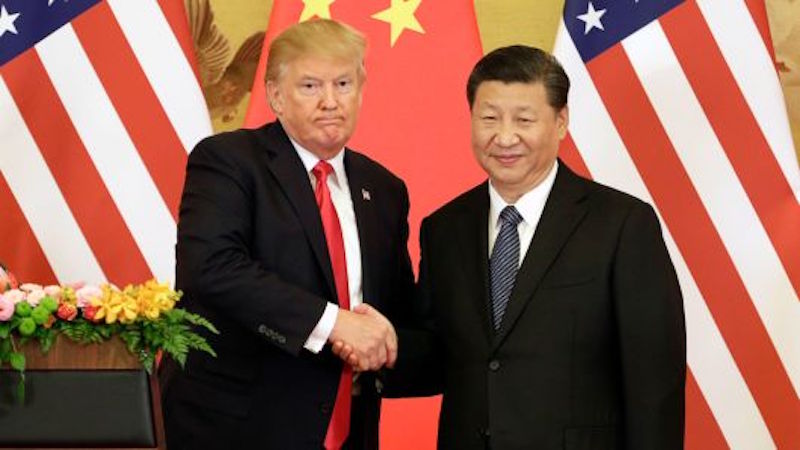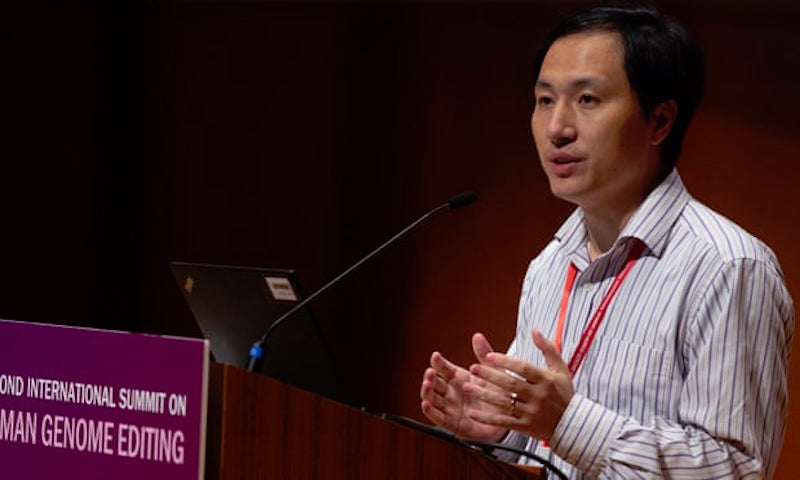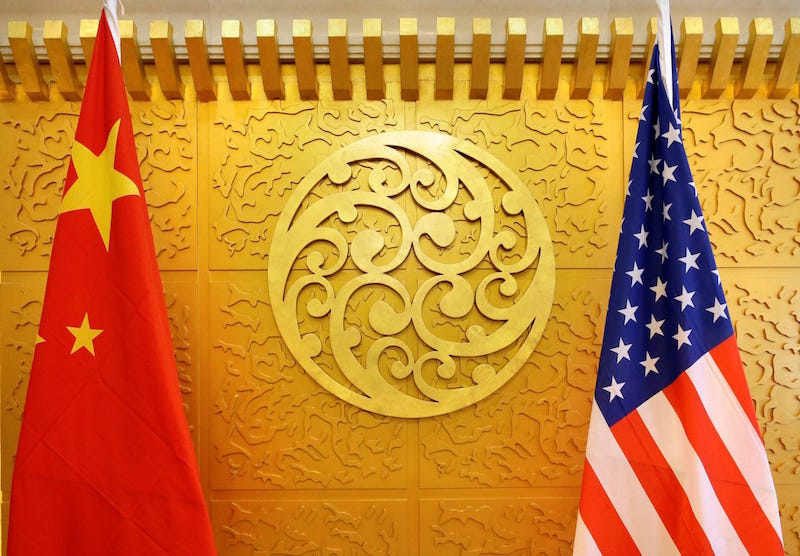
 Trump and Xi Set to Face Off at the G20
Trump and Xi Set to Face Off at the G20President Donald Trump and President Xi Jinping will meet for dinner Saturday to discuss a possible trade deal at the end of the G20 leaders summit in Buenos Aires. Officials on both sides have indicated the deal may halt any further tariffs through the spring in exchange for discussions on changes to Chinese economic policy. The U.S. and China are looking to ease tensions and boost markets, effectively creating a trade "architecture" that includes issues like intellectual property protection, technology transfer and state-owned enterprises.
"I think we'll either make a deal or we'll be taking in billions and billions of dollars a month in tariffs, and I'm OK with either one of those two situations," President Trump told The Washington Post this week. However, that's not really how tariffs work, Vox reports: the U.S. may be generating some revenue from tariffs, but not billions of dollars. Moreover, a lot of the money that is made comes from U.S. consumers — not Chinese companies.
Though it is unclear what the U.S. is specifically asking for, one offer, in return for the suspension of tariffs, is that Beijing would agree to lift restrictions on China's purchases of U.S. farm and energy products. However, for China, holding off on making a deal might be reasonable, said Princeton Politics and International Affairs Professor Aaron Freidberg, as the expansion of Chinese counter-tariffs on consumer goods could hit voters in the wallet right as Trump begins his 2020 reelection bid.
The late addition of White House economic advisor Peter Navarro to the dinner might diminish the chances for a trade deal; he is known for taking a hawkish tone on U.S.-China trade. Despite this, optimism about a deal is still prevalent among big businesses. "Both sides have so much at stake here that they going to reach some kind of agreement," Wells Fargo's Global Chief Investment Officer Kirk Hartman said, adding that any agreement at the meeting "will be extremely positive for the market."
 The Next Frontier of Family Planning: Gene-Edited Babies?
The Next Frontier of Family Planning: Gene-Edited Babies?This week, a Chinese researcher claimed to have helped make the world's first genetically edited babies — twin girls with altered DNA intended to make them resistant to infection with the AIDS virus — who were born this month. Researcher He Jiankui, based in Shenzhen, told the Associated Press that he felt "a strong responsibility that it's not just to make a first, but also make it an example. . .society will decide what to do next."
The news led to an immediate backlash from both the global scientific community and from the Chinese government. The reproductive use of gene editing in human embryos is a violation of Chinese law, Chinese Vice Minister of Science and Technology Xu Nanping told state broadcaster CCTV this week. His ministry has ordered research institutes to suspend all He's ongoing projects; an investigation into the claims, which are as yet unverified, has also been launched.
Speaking to the Human Genome Editing Summit at the University of Hong Kong, He Jiankui said he had self-funded the experiment and that the eight couples involved had signed up voluntarily. Despite the criticism of scientists, as author Mei Fong pointed out in an op-ed for The New York Times, "a recent poll indicated wide support in China for gene editing to treat disease, with 24 percent in favor of legalizing gene editing for enhancing intelligence. By contrast, 68 percent of Americans say they are worried about gene editing and its effects."
In this week's edition of China-US Focus' podcast At Large, host James Chau discusses his reaction to the news, as well as its relevance to global health and the fight against AIDS. He interviews Professor Sharon Lewin, Director of the Doherty Institute, who's searching for the AIDS cure. Listen to the episode on our website.
 Chinese Communist Party Influence Attempts Probed In New U.S. Report
Chinese Communist Party Influence Attempts Probed In New U.S. ReportOn Thursday, a working group of specialists convened by the Hoover Institution and the Asia Society's Center on U.S.-China Relations released a report that sparked international attention, declaring, "Except for Russia, no other country's efforts to influence American politics and society is as extensive and well-funded as China's."
Released on Thursday, "Chinese Influence & American Interests: Promoting Constructive Vigilance," warns of the Chinese Communist Party's attempts to change perceptions of China in U.S. universities, think-tanks, companies, and media. Despite statements made by U.S. President Trump and Vice President Pence, the report concludes that China did not make a direct effort to interfere with the recent U.S. midterm elections. In a separate statement, U.S. Department of Homeland Security Secretary Kirstjen Nielsen described China's influence operations in U.S. politics as "the more traditional, holistic state-influence campaigns."
Prominent China scholars involved in the report include Orville Schell, Bonnie Glaser, John Pomfret, and some of the strongest Western advocates of engagement with China, such as Winston Lord, the U.S. ambassador to China who accompanied Henry Kissinger during his 1971 trip to Beijing. Despite the report's overt stance on Chinese influence attempts, individual members of the working group have articulated conflicting opinions. Elizabeth Economy, director of Asia studies at the Council on Foreign Relations, argued, "while there is cause for concern, much of the drama that surrounds a lot of the discussion is not merited." Susan Shirk went further, describing her concern of a U.S. "return to an anti-Chinese version of the Red Scare we had during the Cold War."
Beijing has consistently pushed back on allegations of interference in U.S. politics, with Foreign Ministry spokesperson Hua Chunying describing the comments as "groundless accusations" and "hearsay evidence." Unfortunately, as China-US Focus contributor Kerry Brown wrote this week, "the consensus amongst commentators inside and outside the U.S. is that policy towards China is not going to change."
 This Week's Top CommentaryIn a piece this week, China-US Focus contributors Daniele Brombal and Angela Moriggi explore China's urbanization process, analyzing how it could either improve or make worse some of the issues currently facing China, including "environmental degradation and climate change, the battle for greater social equality, and the sustainable provision of essential services for all." China has taken steps toward sustainable urbanization, with mixed results. Unfortunately, as the authors argue, sustainability solutions are typically motivated by political and corporate interests and citizens do not have the means to effectively participate and influence decision-making. So, "for the time being, meaningful societal participation, an ecologically aware empathy towards nature, and cultural diversity are not likely to find space in China's urban planning." Read the full article here.
This Week's Top CommentaryIn a piece this week, China-US Focus contributors Daniele Brombal and Angela Moriggi explore China's urbanization process, analyzing how it could either improve or make worse some of the issues currently facing China, including "environmental degradation and climate change, the battle for greater social equality, and the sustainable provision of essential services for all." China has taken steps toward sustainable urbanization, with mixed results. Unfortunately, as the authors argue, sustainability solutions are typically motivated by political and corporate interests and citizens do not have the means to effectively participate and influence decision-making. So, "for the time being, meaningful societal participation, an ecologically aware empathy towards nature, and cultural diversity are not likely to find space in China's urban planning." Read the full article here.
Prepared by China-US Focus editorial teams in Hong Kong and New York, this weekly newsletter offers you snap shots of latest trends and developments emerging from China every week, while adding a dose of historical perspective.
- 2018-11-26 Xi Strengthens Alliances in Preparation of G20
- 2018-11-16 World Leaders Meet at ASEAN and APEC Summits to Discuss Economic Strategy
- 2018-11-09 US and China Hold Delayed Diplomatic and Security Dialogue
- 2018-11-02 Presidents Xi and Trump Talk Possible Trade Deal
- 2018-10-26 With U.S. Pressure, China and Japan Grow Closer
- 2018-10-19 Secretary Mattis Meets Chinese Counterpart in Singapore
- 2018-10-12 Trump and Xi May Meet at the G20
- 2018-10-05 U.S. Vice President Articulates Hard Line on China in Speech
- 2018-09-28 A Turbulent Week For China-U.S. Relations at the UNGA
- 2018-09-21 China Will Not Purposefully Devalue the Yuan, Premier Li Keqiang Says
- 2018-09-14 China and the U.S. Discussing New Trade Talks, As Pressure Over Trade Policy Grows
- 2018-09-07 Forum on China-Africa Cooperation Yields New Pledges
- 2018-08-31 BRI’s Fifth Anniversary Comes Amidst Debate Over Sustainability
- 2018-08-24 Trade Talks Continue in DC as New Tariffs Hit
- 2018-08-17 Trade Talks Back On
- 2018-08-10 American Natural Gas Industry Braces for New Chinese Tariffs
- 2018-08-03 Tentative Signs of U.S.-China Cooperation at the ASEAN Summit
- 2018-07-27 President Trump’s Trade War Bailout
- 2018-07-20 Xi Charms the World
- 2018-07-13 China Defends WTO Record in the Face of Additional U.S. Tariffs